Almost a decade ago, my love of board-gaming was kick-started by a single game. That game was Fantasy Flight's Battlestar Galactica board game. For a period of a couple years, my friends and I were playing that game once or twice almost every month. Even after we started branching out to other games, BSG would regularly grace our tables.
The Battlestar Galactica board game kick-started my tabletop hobby.
Unfortunately, as time went on, members of the regular group(s) that I played with got new jobs, moved, started families, and it became harder and harder to get a large enough group together to play a 4 or 5-hour long board game. Eventually, BSG (along with all my other games) started collecting dust on a shelf.
It wasn't until a few years ago that I finally got back into having semi-regular board game sessions, thanks primarily to my girlfriend taking an interest in X-Wing. Most of our board gaming in the past years has been dominated by either quick group games (such as Dominion, One Night Ultimate Werewolf, Resistance, or Cards Against Humanity), or smaller, two-player games (like the aforementioned X-Wing). No one game has dominated in quite the same way that BSG did. I'd like to play it again, and maybe someday I'll even put up a review of it, but we haven't dusted the ol' game off because we rarely have the time for it. When we do have a whole evening cleared for an epic game, we try to play other games that we haven't already played the hell out of.
Well, clearly, I wasn't the only one who loved Battlestar Galactica, but wished it didn't take so bloody long to play, because Evan Derrick's 2011 game Dark Moon is basically a reskin of Battlestar Galactica that only takes an hour and a half to play. Dark Moon accomplishes this by reducing a lot of the mechanical complexity and by making progress in the game a lot more straight-forward. Virtually every mechanic or interaction in Dark Moon is a direct analog to a mechanic or interaction in BSG.
The shape-shifting space monster among us
The core conceit of Dark Moon (and Battlestar Galactica) is that the game is a semi-cooperative game in which most of the players are working together to try to prevent their moon-based mining station from falling apart around them. However, one or more of the players is secretly a shape-shifting alien (an "infected") who is trying to sabotage the station and kill all humans. Players take turns performing a single action to try to stabilize the deteriorating mining station. However, the most efficient action is to "issue an order" to another player to allow that player to take multiple actions. The catch is that the player you give the order to may secretly be a saboteur, so you have to be careful about only giving orders to other players who you trust.
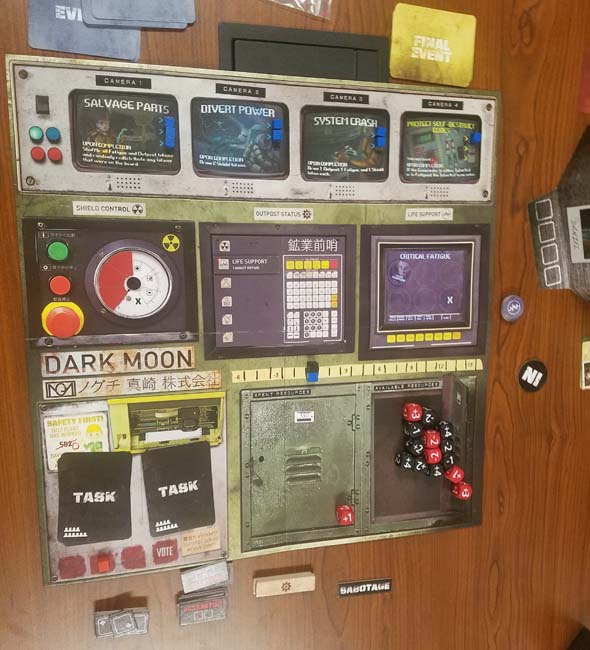
Players cooperate to complete a series of events, but some players are secretly traitors.
At the end of each player's turn, the entire group participates in a group task. Each task card has a pass or fail condition. Passing may result in positive effects for the uninfected players, and failing may result in harmful effects. These group tasks ensure that every player gets to participate in virtually every turn, so you're never sitting around twiddling your thumbs waiting for other players to do things. Even if you weren't participating in the turn, it would still behoove you to pay close attention to what's going on, if for nothing else than to look for any tells or indications that the current player may be an Infected.
Speed versus randomness
One of the sacrifices that was made to speed this game along (compared to BSG) is that almost all actions in the game are resolved by die rolls. This reduces a lot of overhead, but it also introduces a lot of randomness. Each player starts the game with two black dice and two red dice (for a total of four dice). The captain (the only leadership role included in this game) also gets an additional blue die (for a total of five dice). Each die has positive and negative numbers on it, and the red dice are referred to as "weak dice" because they have lower numbers. Most actions in the game involve rolling a set of dice and submitting one or more dice. Positive numbers lead to success (for the humans) and negative numbers lead to failure.
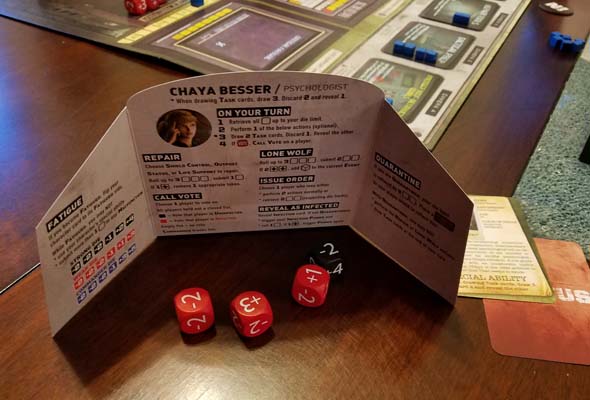
Players roll dice behind a screen and then chose which results to include in a task or check.
Any dice that you submit to a given check are removed from play until your next turn, meaning you won't have them available for any tasks that come up on other players' turns, or for being able to be issued an order. The dice are a limited resource, and the entire game is spent balancing your supply of dice. The more you have on-hand at any given time, the more likely you are to roll a desired outcome on at least one die.
Again, the catch is that you roll your dice behind a screen so that only you know the result. You then select which die/dice you want to submit. The other players don't know what the other die results were, so if you're an Infected player, you can chose to play a negative result and claim "all the dice were negative, but I had to pick one." This does, however, introduce the game's one potentially-fatal flaw: it is absolutely critical that you are playing with honest players. If players lie about their die results, and flip the die to a desired result while it's still behind the screen, then the whole game can become skewed.
Lessons from Battlestar Galactica...
As great as the Battlestar Galactica game is, it did make a few minor rookie mistakes, and is a bit bloated in some areas of design. Dark Moon seems to have learned a lot of lessons from Battlestar Galactica beyond just distilling the base mechanics down into a more approachable package.
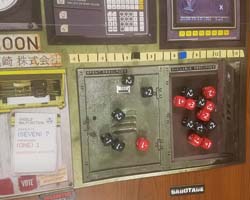
There's a score track for tasks.
In addition to simplifying most actions by reducing them to die rolls, Dark Moon also eliminates character movement. You don't have to spend any time thinking about where on the board you need to be in order to do something, nor do you ever have to be frustrated by having to waste an entire one of your precious turns simply moving to a space on the board in order to prepare yourself for an action on a subsequent turn or executive action.
You also don't have to deal with hands of cards, as the skill cards of BSG are replaced by the dice of Dark Moon. This also eliminates the overhead of having to shuffle cards, deal them out, and spend extra time thinking or debating over which card type(s) you want to draw. You also get a score track for tasks, instead of having to add up a bunch of cards. Elimination of movement and use of dice, by themselves, speed up the game tremendously.
If you've ever played BSG, then you also know that each of the Cylon loyalty cards has a wall of text describing a unique ability when you reveal yourself to be a Cylon, but the "You are not a Cylon" card have a single sentence telling you that you are not a Cylon. In the first game with any new group of players, we were able to trivially identify the Cylons in the group because they were the only players who took more than just a couple seconds to read their loyalty cards. After a few games, we imposed a house rule that everyone needs to spend at least ten seconds reading and re-reading their loyalty card, regardless of whether they were human or Cylon.
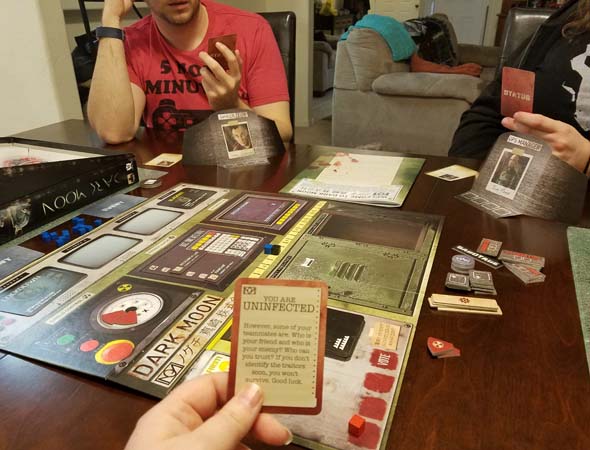
The "You are not infected" card has as much text to read as the "Infected" card.
Apparently, Evan Derrick had this same problem too. The "Uninfected" card in Dark Moon has an equivalent amount of text as the various "Infected" cards. This means that during the step when everyone looks at their status card to determine if they are human or not, everyone has an equivalent amount of text to read. yeah, sure, you can still tell that the card is an "Unifected" card with a single glance, but the rules also have the foresight to specifically state that one player should count down from 10, and that all players should spend that entire countdown staring at their card. Observant players aren't necessarily going to be able to pick out the infected player(s) by recognizing who is taking the longest to read their card.
... But not a strict upgrade
All that being said, Dark Moon doesn't feel like a strict upgrade or replacement for Battlestar Galactica, as there's a few fun wrinkles to BSG's game flow that are not included in Dark Moon. A lot of the mechanical simplifications means that there's fewer mechanical loopholes for a traitorous character to use to justify seemingly sub-optimal play. You only have the dice. You can't complain about not being on the right place on the board, or about not having the right card (even if you draw that type of card), or about some character flaw making it impractical for you to perform a specific move or action, and so forth.
The game isn't very long, so infected players can't wait too long before making a move.
The most obvious difference is that the shorter length means you don't get as much time to sow distrust as a concealed infected. Dark Moon is almost too short. It just doesn't last long enough for you to play a long game of deception or to try to pit the other players against each other. There also isn't really much for a revealed Infected player to do, so it's kind of hard to judge when is a good time to reveal yourself. This is something that BSG also struggled with, and each new expansion seemed to swing Cylon player strength from one extreme to the other.
Dark Moon also lacks the sense of entropic attrition and tension that BSG excels at. BSG almost always provides a sense of constant decline for the human players, as resources are almost constantly being drained, the ship is being damaged, and threats are constantly around the corner. Resources almost never go back up, and repairing damage and fighting off threats is a challenge. The players are often forced to run away from danger, rather than confront it. Dark Moon, on the other hand, has more wild swings. Damage is constantly being done to the station, but repairs are relatively easy. Your turn might come around, and the game could look hopeless, but the next time your turn comes around, it's swung completely in the other direction and the humans seem to be walking away with the game. In fact, the game does seem to be a bit too easy for the human players. Either that, or we just haven't really figured out how to play well as infected players.
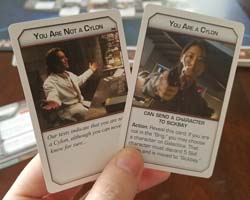
Dark Moon does not have BSG's
mid-game sleeper agent phase.
BSG also has a mid-game "sleeper agent" phase in which an additional set of loyalty cards is passed out to each player, and a formerly-human player may suddenly switch sides to the Cylons. Human players in BSG, thus, have to contend with the perverse incentives provided by possible changes in loyalty midway through the game. Human players may want to play conservatively in the first half because they may turn out to be a sleeper agent Cylon during the mid-game loyalty deal, or if a Cylon player hands off a Cylon loyalty card to you. This means that even genuine human players may approach the first half of the game with a certain degree of conservatism that may give grounds for a clever Cylon player to defer suspicion towards that human player. It's a really fun element of that game!
Dark Moon, sadly, completely lacks such a loyalty shifting mechanic (unless such a mechanic is added by an expansion). Whatever faction you're dealt at the start of the game, that is your faction through the end. It's not really a flaw, per se, and I wouldn't even have thought about such an omission if I weren't familiar with BSG. It just means that Battlestar still has a place on my shelf, because when we do have a whole night to spend on one game, I might still prefer BSG over Dark Moon -- especially if everyone present is a BSG veteran.
An excellent game of deception, bluffing, and betrayal
The first time we played Dark Moon, we opened up the shrink wrap, read the rules, and played a game through to completion, all within about two hours. It helped that everyone in that particular group was already familiar with BSG, so it was easy enough to explain the rules by simply comparing each mechanic to its BSG equivalent. In any case, this is one of the few games that I own for which the length listed on the box is actually pretty accurate and representative of my own play experience. We've had games finish as quickly as 45 minutes, and no game (since the first one) has gone longer than 90 or 100 minutes. If you like games of deception, betrayal, or bluffing, then Dark Moon is an excellent middle-weight game. It's longer and more involved than something like One Night Ultimate Werewolf or Resistance or Avalon, but doesn't eat up an entire night like Battlestar Galactica. It's quickly become a favorite for office game nights, and I highly recommend it.
WHAT I LIKE
- Accuse your friends of lying and betrayal!
- Quick and simple to set-up, learn, and play
- Plays relatively quickly
- All players participate in almost every turn
- Dice-rolling maintains some player-versus-board challenge
- Secret die rolls help infected to justify harmful results
WHAT I DISLIKE
- Die rolls introduce a lot of randomness
- Secret die rolls means player honesty is critical!
- Each player only gets a few turns before game ends
- No "sleeper agent" or allegiance changes
FINAL GRADE: A-
Manufacturer: Stronghold Games
Lead Designer: Evan Derrick
Original release: 2011
MSRP: $59.99 USD
Player(s): 3-7 players
Plays best with 5-7 players
Game Length: 45-90 minutes
Official site: strongholdgames.com/store/board-games/dark-moon/